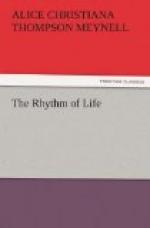The human scenery: yes, costume could make a crowd something other than the mass of sooty colour—dark without depth—and the multiplication of undignified forms that fill the streets, and demonstrate, and strike, and listen to the democrat. For the undistinguished are very important by their numbers. These are they who make the look of the artificial world. They are man generalised; as units they inevitably lack something of interest; all the more have they cumulative effect. It would be well if we could persuade the average man to take on a certain human dignity in the clothing of his average body. Unfortunately he will be slow to be changed. And as to the poorer part of the mass, so wretched are their national customs—and the wretchedest of them all the wearing of other men’s old raiment—that they must wait for reform until the reformed dress, which the reformers have not yet put on, shall have turned second-hand.
THE UNIT OF THE WORLD
The quarrel of Art with Nature goes on apace. The painters have long been talking of selecting, then of rejecting, or even, with Mr. Whistler, of supplanting. And then Mr. Oscar Wilde, in the witty and delicate series of inversions which he headed ‘The Decay of Lying,’ declared war with all the irresponsibility naturally attending an act so serious. He seems to affirm that Nature is less proportionate to man than is architecture; that the house is built and the sofa is made measurable by the unit measure of the body; but that the landscape is set to some other scale. ’I prefer houses to the open air. In a house we all feel of the proper proportions. Egotism itself, which is so necessary to a proper sense of human dignity, is absolutely the result of indoor life.’ Nevertheless, before it is too late, let me assert that though nature is not always clearly and obviously made to man’s measure, he is yet the unit by which she is measurable. The proportion may be far to seek at times, but the proportion is there. Man’s farms about the lower Alps, his summer




